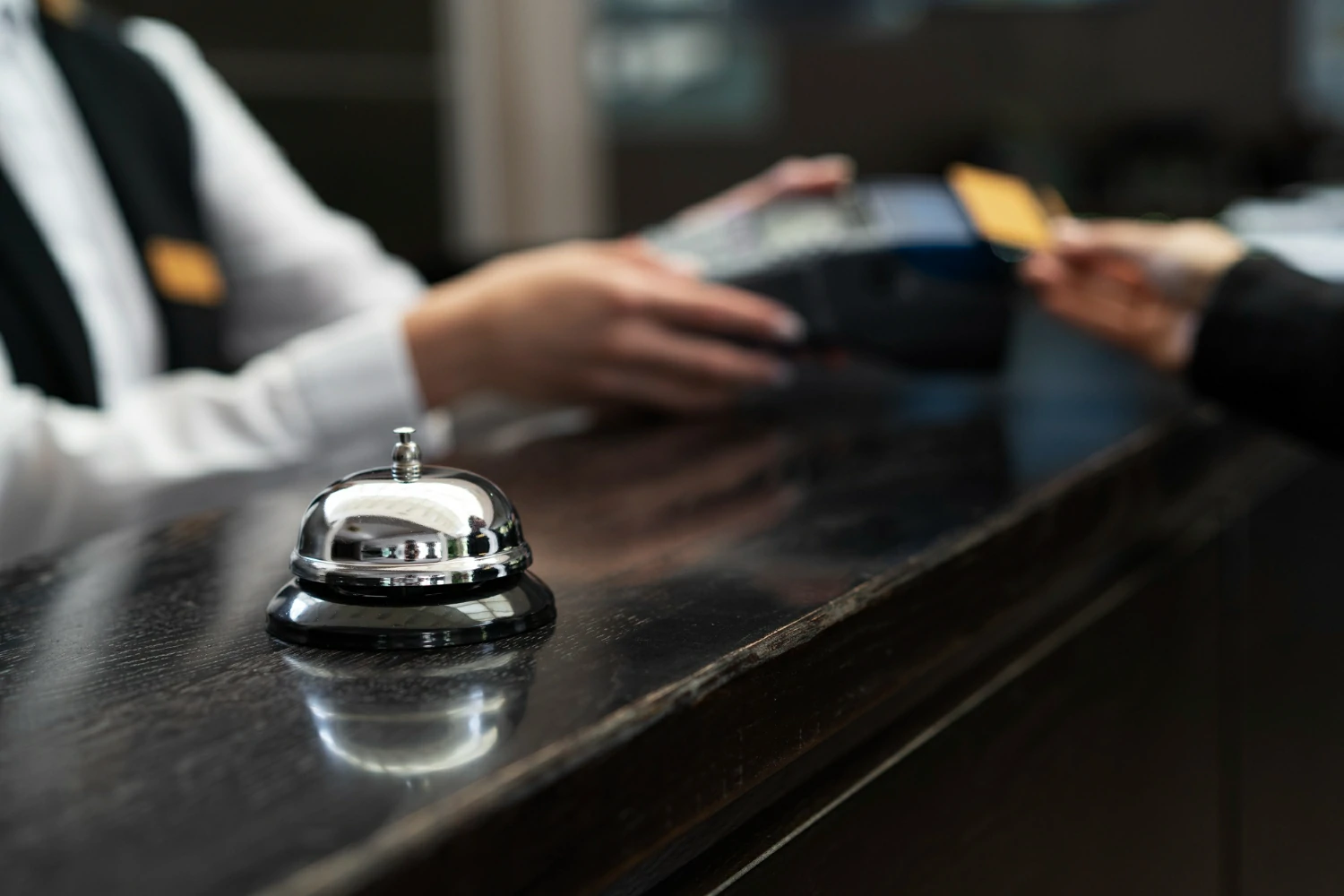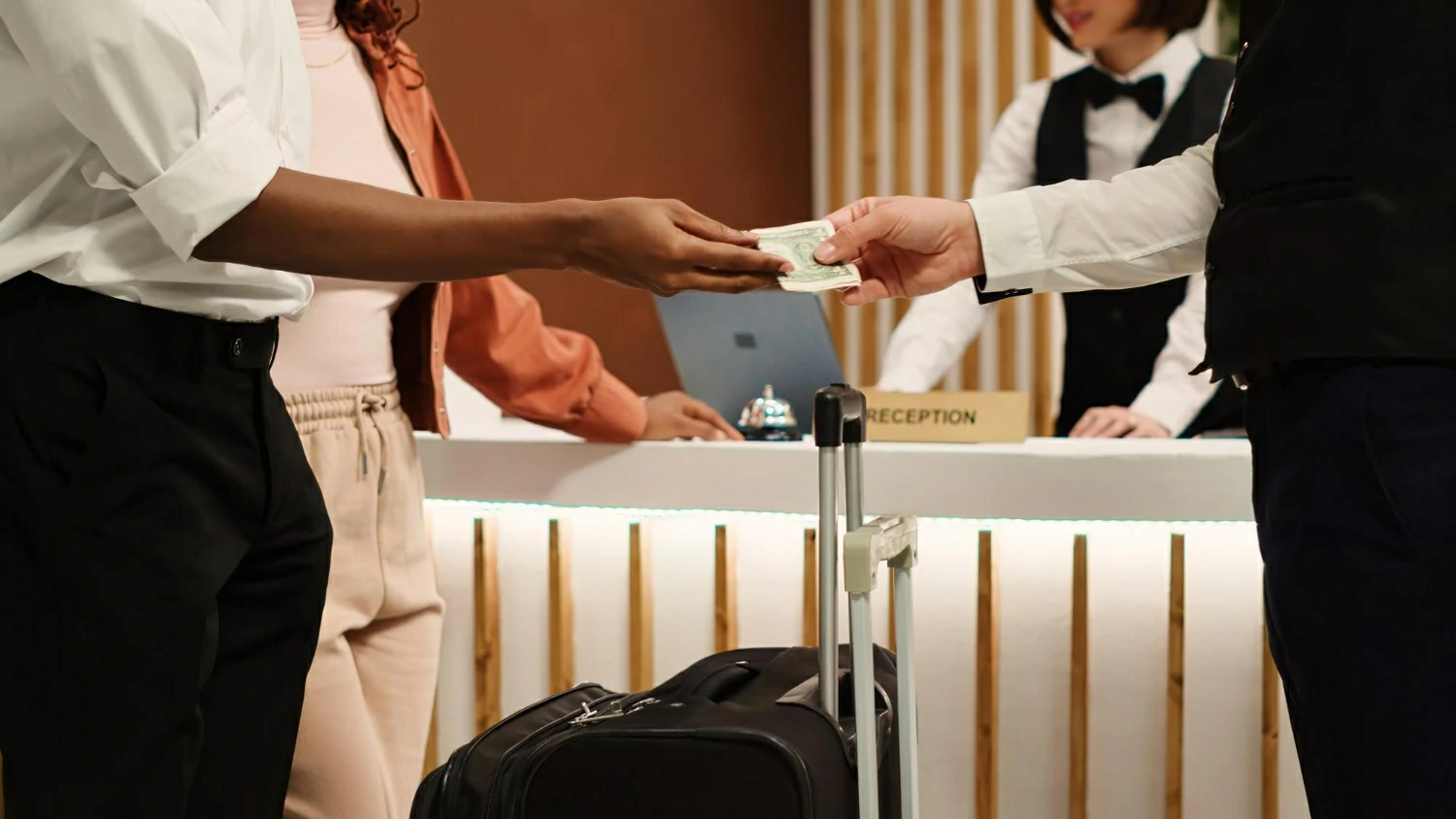When you check out of a hotel, do you just leave? Answer is – It depends on the hotel’s procedures. Most modern hotels allow for express checkout where you can leave your key card in the room and depart. Your final bill is typically sent via email. However, some hotels still require a formal checkout process at the front desk, especially if you have incidental charges or need a printed receipt. It’s always best to clarify the hotel’s specific checkout policy during check-in.
Summary
- Modern hotels often facilitate express checkout, allowing guests to simply leave their key cards in the room.
- Traditional checkout procedures may still be required at some hotels, especially to settle incidental charges.
- Always inquire about the hotel’s checkout policy upon arrival.
- Leaving without checking out could potentially lead to extra fees.
- Consider how you prefer to receive your final bill (email or printed copy).
When you check out of a hotel, do you just leave?

Checking out of a hotel might seem like the most straightforward part of your stay, but there’s more to it than meets the eye. Whether you’re a seasoned traveler or an occasional vacationer, understanding the basics of hotel checkout and why it matters can save you time, avoid unexpected fees, and ensure a positive overall experience.
The Basics of Hotel Check-Out
At its core, hotel checkout is the process of ending your stay and settling your account. This includes:
Returning your room keys: Physical keycards often need to be returned at a designated location, while some modern hotels may utilize electronic key systems.
Reviewing and paying your bill: Your final bill includes your room rate, taxes, and any additional charges you might have incurred (room service, minibar, etc.).
Providing feedback: Many hotels value your thoughts on your stay and may ask you to fill out a brief survey.
Why the Checkout Process Matters
While it may feel like the final hurdle before getting back on the road, a proper checkout serves several important purposes:
Accuracy: The checkout process allows you to review your bill carefully and address any errors or discrepancies. This is especially important for longer stays or when you’ve utilized various hotel amenities.
Security: Many hotels place a temporary hold on your credit card during check-in to cover potential incidentals. The checkout process ensures this hold is released and only the correct amount is charged.
Hotel operations: A smooth checkout system allows the hotel to quickly prepare the room for the next guest, maximizing efficiency and ensuring room availability.
Guest experience: Hotels want to leave you with a positive final impression. Taking the time to check out properly demonstrates respect for the hotel and its staff.
Sarah Patel Expert Opinion
“A quick and accurate checkout process is a win-win for both the hotel and the guest. It helps us streamline our operations and leaves guests feeling satisfied with their experience.” – Sarah Patel, Hotel Operations Manager
When Can You Just Leave a Hotel?
The rise of technology and streamlined processes has transformed hotel checkouts. In many cases, you can simply leave your hotel without a formal interaction at the front desk. This is made possible by express checkout.
1. Understanding Express Checkout
Express checkout allows guests to bypass the traditional checkout line and depart at their convenience. Here’s how it typically works:
Pre-authorization: When you check in, your credit card is often pre-authorized for the room rate, taxes, and a set amount to cover potential incidentals.
Email or app notification: Your final bill is usually sent to you electronically via email or through the hotel’s app. You can review charges at this point.
Key drop: Designated drop boxes or a simple key return procedure at the front desk is often all that’s required.
2. Hotels that Typically Offer Express Checkout
Express checkout is becoming increasingly common, particularly in these types of hotels:
Large chain hotels: Major hotel brands often prioritize efficiency and have systems in place to handle express checkouts seamlessly.
Business-oriented hotels: These hotels cater to guests who might be short on time and appreciate the convenience of express checkout.
Tech-forward hotels: Hotels that heavily use apps and mobile-friendly services are more likely to offer streamlined checkout options.
3. The Benefits of Express Checkout
For both guests and hotels, express checkout offers numerous advantages:
Time-saving: No need to wait in potentially long checkout lines, especially during peak hours.
Convenience: Leave on your own schedule and avoid unnecessary delays.
Contactless: Reduces the need for in-person interaction, a preference for many travelers in the post-pandemic era.
Efficiency for hotels: Frees up front desk staff to assist other guests and allows for faster room turnaround.
Mark Anderson Expert Opinion
“Express checkout has been a game-changer for our guest experience. It gives travelers back precious time while enabling our staff to operate more efficiently.” – Mark Anderson, General Manager
When a Formal Checkout is Necessary

While express checkout is a fantastic time-saver, there are specific circumstances where taking the time for a traditional checkout procedure is the more prudent approach.
1. Incidental Charges and How to Settle Them
Incidental charges are any expenses incurred during your stay beyond the nightly room rate. These can include:
- Dining: Meals at the hotel restaurant or room service
- Minibar: Snacks and drinks consumed from your room’s minibar
- Spa services: Massages, facials, or other spa treatments
- Pay-per-view: Movies or other in-room entertainment options
- Valet parking: If you’ve used the hotel’s valet parking service
When you have incidental charges, it’s wise to check out formally at the front desk. This allows you to:
- Verify accuracy: Carefully review your bill to ensure all incidental charges are correct and match your memory of what you utilized.
- Address questions: If anything looks unfamiliar or seems higher than expected, the front desk can clarify the charges for you.
- Settle your balance: Pay any outstanding charges on your account using your preferred payment method.
2. Requesting a Printed Receipt
Even when hotels send receipts via email, there can be situations where having a physical printed receipt is beneficial:
- Business travel: Many companies require printed receipts for expense reimbursement purposes.
- Record-keeping: Some individuals prefer a physical receipt for their own financial tracking.
- Immediate verification: Getting a printed receipt at checkout lets you confirm the payment has been processed correctly.
Stopping by the front desk is the easiest way to secure a printed copy of your hotel bill.
3. Resolving Any Discrepancies on Your Bill
Despite a hotel’s best efforts, mistakes can sometimes happen. If you find any discrepancies on your bill, a formal checkout is the best way to address them. Common billing discrepancies include:
- Incorrect room rate: Double-check that you’ve been charged the agreed-upon rate for the correct dates of your stay.
- Duplicate charges: Ensure you haven’t been billed twice for the same service or amenity.
- Charges for unused amenities: Verify you haven’t been charged for things like the gym or Wi-Fi if you didn’t use them.
- Mysterious charges: If you see any charges you don’t recognize, bring them to the front desk’s attention immediately.
Lisa Thompson Expert Opinion
“Don’t hesitate to speak up if something on your bill doesn’t look right. Most billing errors are unintentional, and hotels are more than happy to rectify them when brought to their attention.” – Lisa Thompson, Hotel Billing Supervisor
What Does It Mean to Leave Without Checking Out?

Leaving a hotel without checking out means departing without formally settling your bill, returning your keys, and potentially notifying the front desk. This can happen in a few different ways:
Intentional “Skip Out”: Unfortunately, there are rare cases where a guest may deliberately leave without paying their bill. This is a serious issue and can potentially have legal ramifications.
Oversight: In the hustle and bustle of packing up and departing, a guest might genuinely forget to formally check out. Life distractions or rushing to catch a flight can lead to this oversight.
Confusion with express checkout: If a guest misunderstands the hotel’s express checkout policy, they might assume simply leaving the room is all that’s necessary.
1. Potential Consequences
Leaving without checking out can lead to several unintended consequences:
Delayed billing: The hotel will still need to process your charges. They will typically attempt to charge the credit card you provided at check-in.
Inaccurate charges: Without a chance to review your bill, you might miss incorrect charges and end up paying more than you should.
Additional fees: Some hotels may charge a fee for leaving without following standard checkout procedures.
Negative impact on your hotel record: If it appears intentional, leaving without checking out could negatively affect your ability to book future stays at that hotel or within their chain.
Potential legal trouble: In extreme cases of intentional non-payment, a hotel might pursue legal action, especially for large outstanding balances.
2. How Hotels Handle Unannounced Departures
Hotels have procedures in place to manage guests who leave without checking out:
Housekeeping notification: Housekeeping will typically alert the front desk when they find a room vacated with belongings left behind.
Bill review and processing: The hotel will review your account, compile any charges, and attempt to charge the credit card on file.
Communication attempt: They may try to contact you via email or phone to clarify the situation and send your final bill.
Dispute resolution: If you feel there are errors, contacting the hotel directly to explain your side and resolve the issue amicably is crucial.
Brian Johnson Expert Opinion
“While the vast majority of guests check out responsibly, we do have systems in place for those rare instances when someone leaves unexpectedly. Open communication is usually the key to resolving any issues quickly.” – Brian Johnson, Front Office Manager
Tips for a Smooth Hotel Checkout

While the checkout process may seem like an afterthought, taking a few proactive steps can save you time, avoid unexpected fees, and leave you feeling positive about your stay.
1. Review Your Bill Carefully
Whether you receive an emailed bill or a printed one at the front desk, take the time to thoroughly examine your charges. Here’s what to watch for:
- Billing period: Make sure the dates of your stay are correct.
- Room rate: Verify that you’ve been charged the agreed-upon nightly rate.
- Incidental charges: Check these against your memory – do they reflect the restaurant meals, spa treatments, or other services you used?
- Taxes and fees: Review the tax breakdown and be aware of any additional resort fees or other charges that may apply.
If anything looks incorrect or unfamiliar, don’t hesitate to address it with the hotel staff right away.
2. Return Room Key(s) Appropriately
How you return your keys will depend on the hotel’s procedures:
- Traditional keycards: Often, there are designated drop boxes in the lobby or near the front desk. Some hotels may require you to hand them to a front desk agent directly.
- Mobile keys: If your hotel uses a smartphone app for room entry, the disablement of your digital key may happen automatically upon checkout. Confirm this with the hotel.
Returning your keys properly not only helps the hotel, but can prevent you from accidentally being charged for lost keys.
3. Request a Late Checkout If Needed
Standard checkout times are typically around 11 AM or noon. If your departure plans require more time, inquire about the possibility of a late checkout.
- Availability: Not all hotels can accommodate late checkouts, especially during peak seasons. It’s best to ask as early as possible – even during check-in.
- Fees: Some hotels offer late checkouts for free, while others may charge a fee depending on how late you need the room.
- Alternatives: Even if a late checkout isn’t possible, ask if the hotel can securely store your luggage while you wait for your flight or transportation. Many hotels have dedicated luggage rooms for this purpose.
4. Utilize the Hotel App (If Available)
Many hotels now have mobile apps that streamline various aspects of your stay, including checkout. Check if your hotel has an app and explore its features:
- Express checkout: Some apps allow you to complete the entire checkout process digitally.
- Bill review: You may be able to view your updated bill in real-time through the app.
- Communication: Use the app to communicate with the front desk, request late checkout, or inquire about any questions you have.
Emily Davis Expert Opinion
“Hotel apps are transforming the guest experience. They put control in guests’ hands, empowering them to manage their stay and checkout process with ease.” – Emily Davis, Hotel Technology Specialist
FAQs
Is there a standard checkout time?
Yes, most hotels have a designated checkout time, typically between 10 AM and 12 PM. However, it’s always best to confirm the specific checkout time for your hotel upon arrival. You can find it posted in your room or on the hotel’s website.
What if I need to leave before the front desk opens?
If you have an early departure, inform the hotel in advance. Here’s what to expect:
- Express checkout: Many hotels will facilitate express checkout if you’ve pre-authorized your credit card. You can often leave your key in the room or a dropbox and your bill will be emailed.
- Night drop: Some hotels may have a designated late-night drop box for keys and checkout paperwork.
- Communication is key: Always explain your situation to the hotel staff so they can guide you through the best process.
Can I get a copy of my bill emailed to me?
Yes, the majority of hotels now send final bills electronically. If you don’t automatically receive one in your email, you can request a copy at the front desk or contact the hotel after your stay.
What happens if my luggage doesn’t fit in my car after I check out?
Don’t worry! Many hotels are happy to store your luggage for a few hours after you’ve officially checked out. Simply inquire at the front desk or with the bellhop/concierge about luggage storage options.
Do I need to tip the housekeeping staff?
While not mandatory, it’s a thoughtful gesture to leave a tip for housekeeping, especially for longer stays and any extra cleaning services you might have used. There’s often an envelope in the room where you can leave a tip and a note of thanks. A standard tip in the US is around $2-5 per night.
What if I find an additional charge on my credit card after leaving the hotel?
First, check your receipt or emailed bill to see if you missed the charge during your original review. If you still believe the charge is incorrect, contact the hotel’s billing department immediately. Most hotels are happy to investigate and resolve discrepancies promptly.
Conclusion
A well-executed hotel checkout is an often overlooked aspect of a satisfying travel experience. By understanding the different checkout methods, planning ahead, and communicating with the hotel staff, you can avoid unnecessary fees and ensure a smooth end to your trip.







